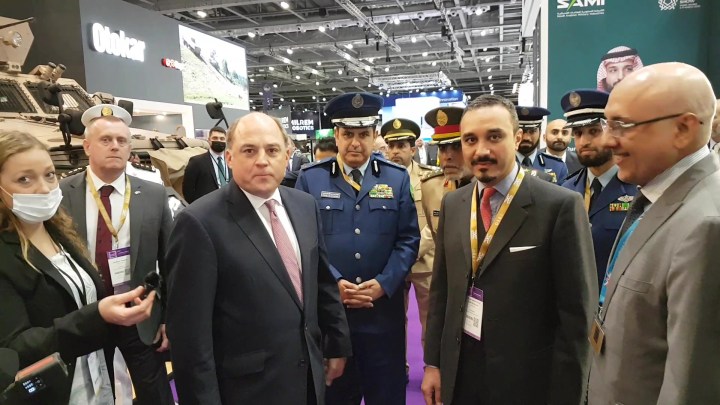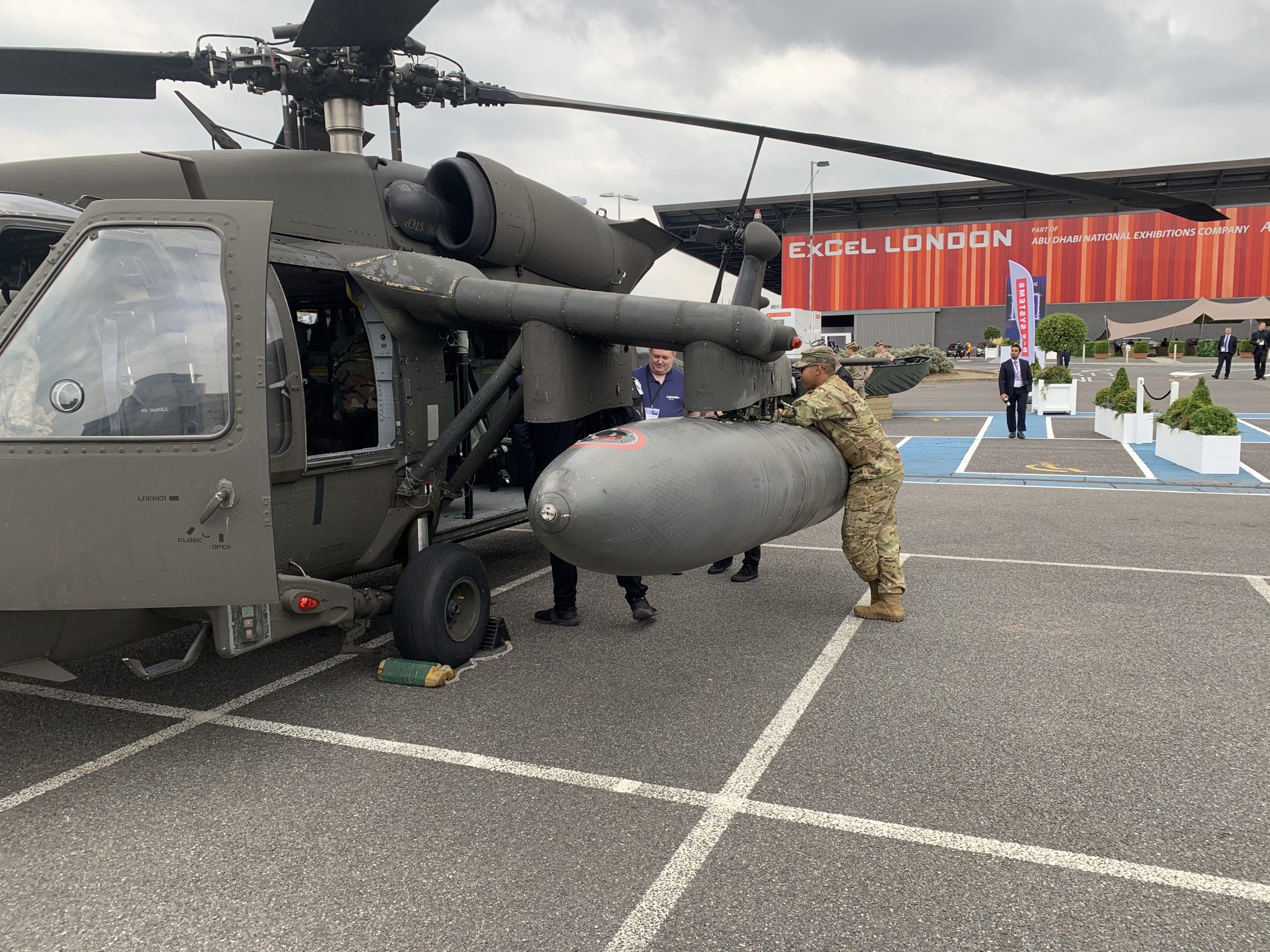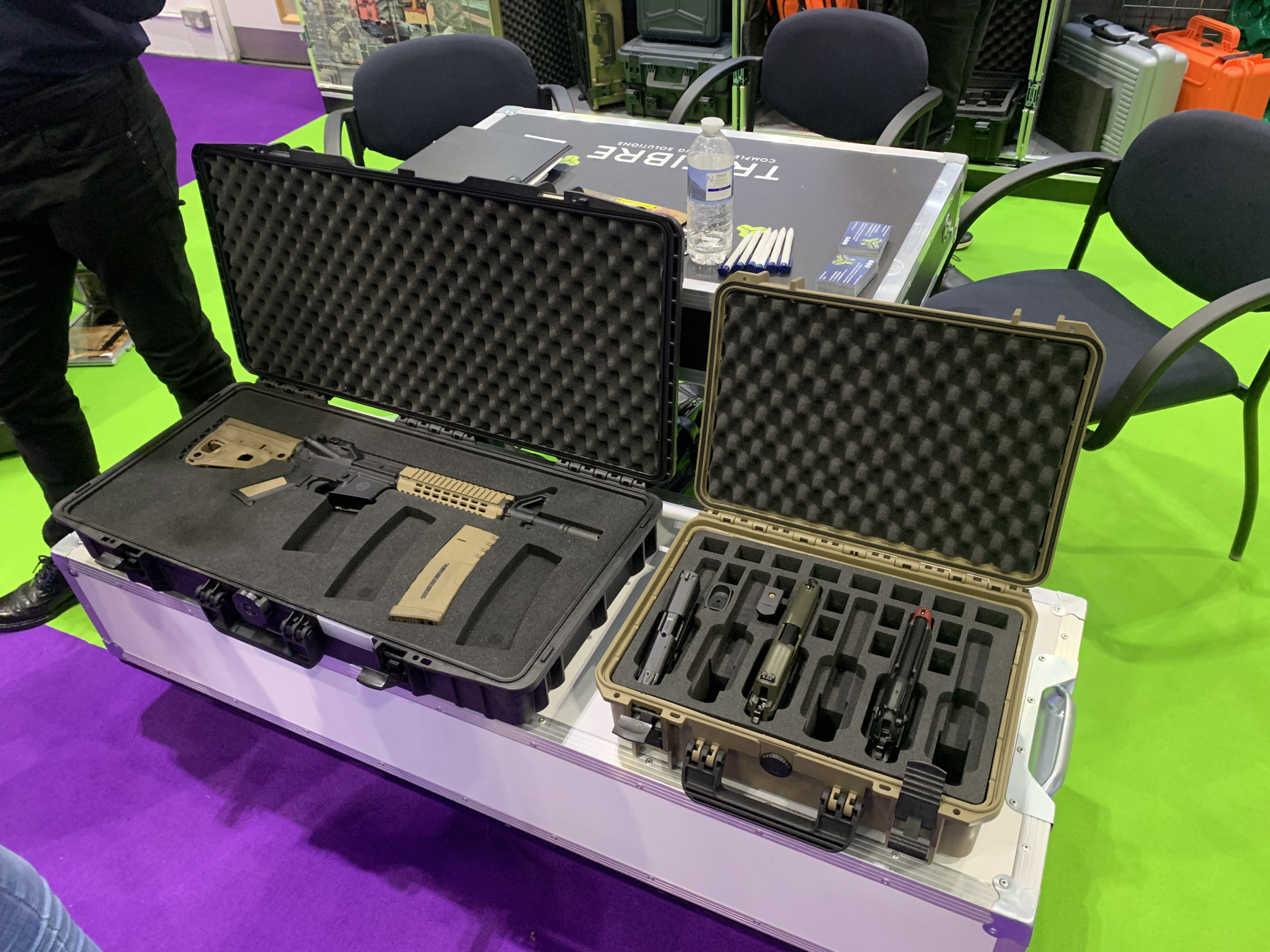DECLASSIFIED UK
‘Nothing to hide here’: Inside the world’s largest arms fair in the heart of London

Declassified manages to get inside the DSEI arms fair and finds corporations and governments complicit in the deaths of civilians everywhere, as we questioned the British defence secretary over continuing UK support to Saudi Arabia.
“Controversial depends on your point of view, really. There are plenty of high-level political viewpoints that would say that it’s not.”
Major General Roddy Porter has just bought us a coffee and is telling us why the world’s largest arms fair – being held in the heart of London – isn’t controversial, despite being opposed by the city’s mayor, Sadiq Khan.
Porter is a 31-year veteran of the British Army who is now retired but returns to the frontline every few years to work as chief spokesman for Clarion Events, the organisers of the arms fair. He is also a trustee of a Christian charity.
“We’ve got nothing to hide here,” he continues. “This is a legitimate government transactional business.”
He has been giving us a personal briefing for 30 minutes, a benefit not afforded to all media, he admits. Declassified UK is one of the lucky few, and we’re not entirely sure why. Reporters from Private Eye magazine were not even allowed in. We shake Roddy’s hand, thank him for the coffee and go on our way.
DSEI takes place at ExCel London, a huge convention centre on the banks of the River Thames. The exhibits are arranged along two 480,000 square foot hangars running down the length of the building, which is owned by Abu Dhabi, a repressive Gulf emirate.
Last year, ExCel let the National Health Service use the venue rent-free for the Nightingale hospital to deal with the Covid crisis, although almost no patients were actually treated there. In the darkest days of the pandemic, arms companies promised to start making life-saving medical equipment instead of bombs.
But this week it looks like a return to business as usual.

A US soldier leans on a Black Hawk helicopter outside DSEI on 15 September 2021. (Photo: Matt Kennard / Declassified UK)
‘Hit-To-Kill’
Inside the fair, as far as the eye can see, are missiles, guns, drones, rocket launchers, bullets, turrets, lasers, surveillance systems, tanks, electronic warfare equipment, helicopters, artillery. Every weapon it’s possible to imagine, and many you can’t, is here. And everything is supremely clean, sterile even, ready for the market.
The missiles are especially well-polished, sparkling under the strip lights attached to the ExCel ceiling. Men in expensive suits, perfectly coiffured, stand next to them and talk with prospective buyers. Their teeth flash: perfect white, also glistening under the lights.
For reporters who have covered war around the world, it’s a surreal experience walking around and seeing up close the weapons you’ve written about for years. Over there, on that plinth, is the missile that blew up those children in Yemen; over there, that’s the equipment Israel used in its assault on Gaza.
Porter was right: no one is hiding anything; there is a feeling of celebration, pride even, about the monuments to war on show. This year, however, the mood is not quite as triumphant as previous events: the shadow of Afghanistan and Covid can be felt.
First we stop at the stall belonging to MBDA, a consortium of three major European arms manufacturers. It’s immaculate. There’s barely a mote of dust on any of the dozen or so missiles proudly mounted on perspex stands.
The “RC 200 remote carrier,” which can launch weapons from the air, is huge. Next to it is a missile, which is even bigger. “Missile Defence: Hit-To-Kill System” says the banner accompanying it. Another exhibit is visible behind. This one carries the strapline, “To create a safe and secure world, together”.
On the other side of the MBDA stall are some Brimstone missiles, which are described as “high precision surface attack weapons”. Four of them sit snugly together under a cover.
The Brimstone missile has been used by the Saudi Air Force in its brutal war in Yemen, which has seen countless war crimes, including bombings of school buses and hospitals. A couple of buyers walk past, looking at their phones.
The Brimstone has family, too. On our left is the Brimstone Sea Spear, an “advanced multi-role naval weapon”. This one’s dark grey with a see-through tip. Again, it shimmers gloriously under the lights.
We ask the MBDA media coordinator for an interview. A sharp young man in a perfectly tailored suit looks down at our badges. “We work for Declassified UK, a website covering Britain’s role in the world”, one of us says. He looks at us awkwardly. “We’re not doing on-the-record interviews with media, sorry.”

Missiles made by MBDA on display at DSEI on 15 September 2021. (Photo: Matt Kennard / Declassified UK)
Amongst the corporate arms dealers and their wares, country delegations of top military figures walk the hangars, many in full fatigues. Delegations this year were sent from manifold repressive regimes, including Saudi Arabia, Egypt, Bahrain and Colombia.
We find a friendly Pakistani military officer. Pakistan is on the Covid red list, but he works at its embassy in London so can come along. Despite allegations Pakistan secretly supported the Taliban’s return to power, the officer said Britain’s military welcomed him to DSEI to browse for new equipment.
He smiles a lot when we ask about Afghanistan, but keeps his answers diplomatic. “It’s a developing situation,” he says. “Pakistan has helped evacuate a lot of refugees. We want stability in the region.”
Nearby, Israel Aerospace Industries (IAI) has their stall which carries the strapline: “Where Courage Meets Technology”.
A 20-foot-long missile takes pride of place on their stand. Named the “Sea Serpent”, it has a small logo – a wave turning into a serpent – meant to make it chic. In Israel’s assault on Gaza in May, which killed 256 Palestinians, including 66 children, the Israeli navy shelled the strip from the sea.
Above the Sea Serpent, another contraption is hanging from wire coming down from the ceiling. This is the Mini Harpy, a “multi-purpose tactical loitering munition”. A huge touch-screen behind it allows people to flick between “highlights” and a “movie” of this weapon.
A young man sits in a swivel chair in front of it – perfect suit again. He sees us taking a photograph and smiles. Nearby we spot Elbit Systems, another Israeli arms company, displaying its Skylark 3 drone and “Smart Rocket Launcher”.

Guns on display at DSEI on 15 September 2021. (Photo: Matt Kennard / Declassified UK)
‘Class-leading payload capacity’
Britain’s largest arms company, BAE Systems, has a special status at DSEI. No private British company garners as much government support as BAE. The Department for International Trade has a whole taxpayer-funded unit to promote the British arms industry around the world. In reality, this means mainly BAE.
As we walk onto the BAE stall, we see one of their officials talking with the Brazilian military delegation representing its far-right president Jair Bolsonaro. They look almost normal, just three professors, all peering out from behind rimless glasses. The BAE functionary in a suit briefs them excitedly.
BAE is showcasing its T-650 “Heavy Lift UAS” – a weaponised drone – which hangs triumphantly from the ceiling on thin black string. It has four propellers and underneath the drone sits a Sting Ray missile, which has a “class-leading 300kg payload capacity” that “enables potential for new and disruptive mission types”.
This time, the missile is black. Buyers walk past and point excitedly at it. This is one to be proud of.
The chairman of BAE, Sir Roger Carr, is somewhere on the stand, although we can’t find him. The company’s social media later showed him hosting the Saudi ambassador to the UK, Khalid bin Bandar, a member of the royal family whose father was head of Saudi intelligence.
The young Bandar is an Anglophile, educated at Eton, Oxford and Sandhurst, before marrying Lucy Cuthbert, a member of the British aristocracy. When we catch up with Bandar at DSEI, he is touring the Saudi Arabian Military Industries stand, beneath an enormous beaming photo of his relative, crown prince Mohammed Bin Salman – the man accused of orchestrating the murder of journalist Jamal Khashoggi.
Bandar is joined by Britain’s defence secretary Ben Wallace, who congratulates him on the country’s imminent Formula 1 Grand Prix debut.
The pair have an impressive entourage of plain-clothed security, ornately decorated military top brass and pliant Middle Eastern journalists. Their eyes all turn on us as we shout out a question to Wallace about his relations with the Saudi regime and Khashoggi’s murder.
“The Saudis have been our friends for many, many, many decades,” Wallace shoots back, before scurrying off as a Saudi air force officer elbows us to one side. The conversation is edited out of Saudi TV broadcasts from the event.
Finally, we head to Northrop Grumman, a US company that is one of the largest arms manufacturers in the world. Their 20-foot-long AARGM missile elegantly hangs from the ceiling with the company logo running along the side.
Underneath sits a gun turret the same length, giving the display some symmetry. The stall has a huge banner running above it. “Defining Possible”, it beams.
We speak to a media relations representative again. Another look at our badges. “We are not doing on-the-record interviews,” we’re told again. But she hands us a couple of paperclipped A4 sheets instead.
“We have made an exciting announcement at DSEI though,” she says. We look down. The US company is joining with Leonardo, an Italian arms manufacturer, to produce the “next generation autonomous uncrewed aerial systems”. We smile and move on.
Outside next to the docks, where activists have dropped a giant Palestine flag from an abandoned building, US soldiers are displaying a Black Hawk helicopter that they’ve flown in especially for DSEI from an air base in Germany.
The US military has several thousand Black Hawks, we are told. But how many do the Taliban have now? “A little bit less,” the soldier replies sheepishly. Just across from the soldier, smoke rises into the overcast London sky from meat cooking at a food stall. “Top Gun: Kansas City BBQ” reads the banner draped across it.
Before we finished up with Major General Porter, we asked him about the protesters that have been camping outside ExCel and trying to obstruct the delivery of weapons to the arms fair. He expected the question, and this one was personal. “You don’t need to tell a soldier that war is a bad thing, we’ve seen it,” he told us. “I’ve seen people blown to pieces, I’ve seen people shot, I’ve seen my friends, and my soldiers, killed.”
He continued: “I’m retired now, but as a serving soldier I never wanted to see that again. Yet, most of us think that doing this is important because we can make a contribution towards stability and security.”
Matt Kennard is chief investigator, and Phil Miller is chief reporter, at Declassified UK.
Follow Declassified on Twitter, Facebook and YouTube. Sign up to receive Declassified’s monthly newsletter here.
This article was amended to accurately reflect the RC 200 Remote Carrier.













 Become an Insider
Become an Insider
It is a fact that arms manufacturers need war to survive and BAE systems was only one of them who climbed in to sell the new Rainbow nation of South Africa arms which we did not need and bribed corrupt greedy politicians to rob the South African taxpayers of money which was sorely needed to uplift the poor . They have rivers of blood on their hands.
In the 70’s I worked as a support person for International Computers and Denel was one of our customers. At one point my manager wanted to give me the responsibility of supporting Denel. I am a pacifist so I told him that I would not be able to do it. Luckily he accepted my position and assigned me to another customer instead.